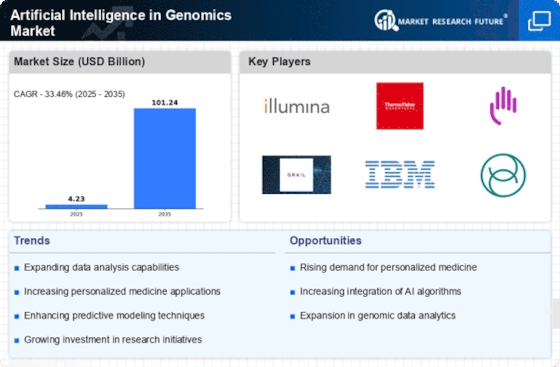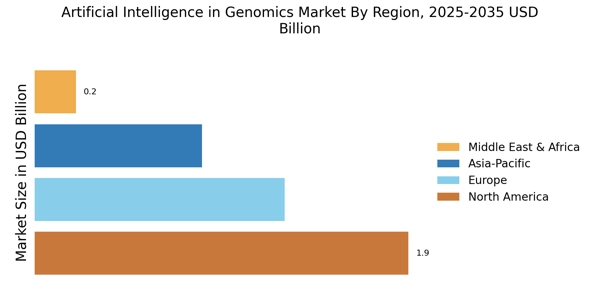Emergence of Cloud Computing Solutions
The rise of cloud computing solutions is transforming the Artificial Intelligence in Genomics Market. Cloud platforms provide scalable resources for storing and analyzing large genomic datasets, making advanced AI tools more accessible to researchers and healthcare providers. This shift allows for collaborative research efforts across institutions, enhancing the overall efficiency of genomic studies. Furthermore, the cost-effectiveness of cloud solutions is appealing to smaller organizations that may lack the infrastructure for extensive data analysis. As cloud adoption continues to grow, the market is anticipated to expand, with a projected increase in cloud-based genomic applications.
Regulatory Support for AI in Healthcare
Regulatory support for the integration of AI in healthcare is a significant driver for the Artificial Intelligence in Genomics Market. Governments are increasingly recognizing the potential of AI technologies to improve patient outcomes and streamline genomic research. Initiatives aimed at establishing clear guidelines for the use of AI in genomics are being developed, which fosters innovation and encourages investment. This supportive regulatory environment is likely to enhance the adoption of AI solutions in genomic applications, contributing to market growth. Analysts predict that as regulations evolve, the market could see a substantial increase in AI-driven genomic products and services.
Advancements in Data Analysis Techniques
The Artificial Intelligence in Genomics Market is experiencing a surge in advancements related to data analysis techniques. The integration of machine learning algorithms enables researchers to process vast amounts of genomic data with unprecedented speed and accuracy. This capability is crucial as the volume of genomic data generated continues to grow exponentially. For instance, the ability to analyze whole-genome sequencing data has improved significantly, allowing for more precise identification of genetic variants. As a result, the market is projected to witness a compound annual growth rate of over 30% in the coming years, driven by the demand for efficient data processing solutions.
Growing Demand for Personalized Medicine
The shift towards personalized medicine is reshaping the landscape of the Artificial Intelligence in Genomics Market. Patients increasingly seek treatments tailored to their genetic profiles, which necessitates advanced genomic analysis. AI technologies facilitate this by enabling the identification of specific genetic markers associated with diseases. Consequently, pharmaceutical companies are investing in AI-driven genomic solutions to enhance drug development processes. This trend is likely to propel the market forward, with projections indicating a potential market size of 15 billion dollars by 2026, as personalized medicine becomes a standard practice in healthcare.
Increased Investment in Genomic Research
Investment in genomic research is a key driver for the Artificial Intelligence in Genomics Market. Governments and private entities are allocating substantial funds to enhance genomic studies, which in turn fuels the demand for AI technologies. For example, funding initiatives aimed at understanding genetic diseases and developing targeted therapies are on the rise. This influx of capital not only supports research but also encourages collaborations between tech companies and research institutions. As a result, the market is expected to expand significantly, with estimates suggesting a valuation exceeding 20 billion dollars by 2027.

















